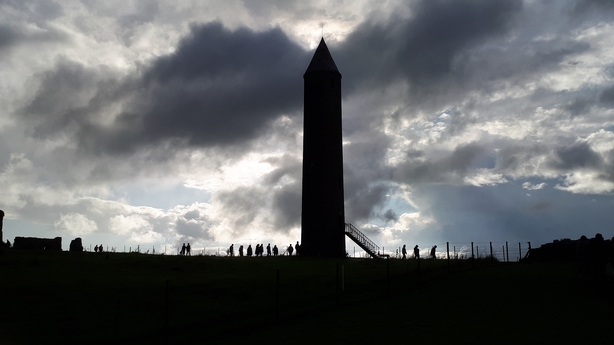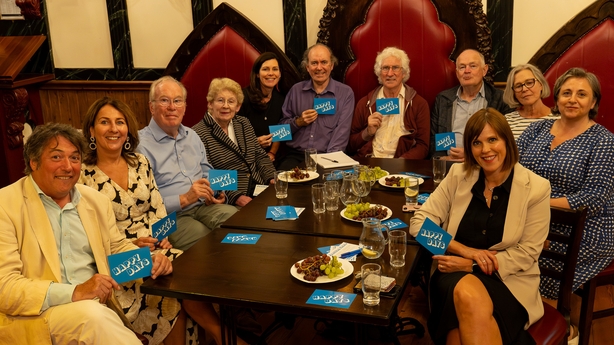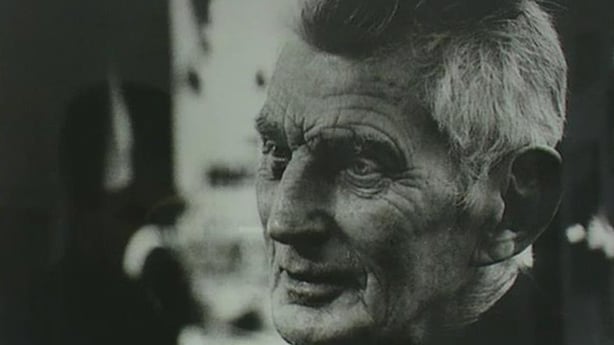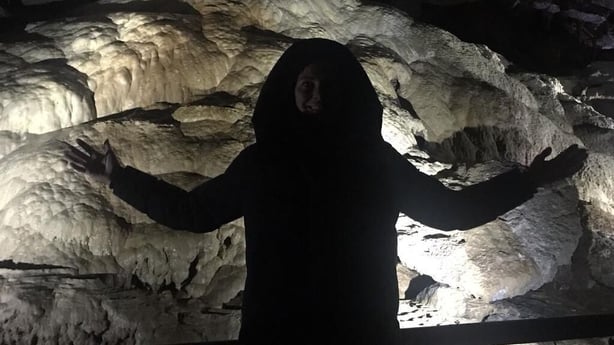Paul Sternberg is Co-Chair of the Happy Days Enniskillen International Beckett Festival, which last year celebrated its 10th anniversary. Below, he tells RTÉ Culture about the organisation's new Festival Tales project to capture the stories and reminiscences of a decade of Beckett and Wilde Festivals and public art projects in Enniskillen.
With my dictaphone and camera in hand, I arrived in Enniskillen, County Fermanagh, with a burning desire to unearth the treasure trove of stories, conversations and experiences amassed during ten years of carefully curated performative Happy Days Enniskillen International Beckett Festival programmes.
Since setting up Channel 4’s Northern Ireland office in the early noughties with the late and wonderful Peter Logue who sadly passed away in 2020, I have had a deep fascination with the extraordinary and compelling lives of the people of Northern Ireland, of the borderlands, of what Dermot Healy describes in his beautifully titled novel Fighting with Shadows, as the 'in-between spaces.’

departing Devenish Island at dusk (Pic: Anne Beattie)
No doubt this on-going fascination with the liminal spaces and multiple identities of the North of Ireland has to do with my own heritage: my grandfather from the ancient Carrowmannan townland in South Armagh, my grandmother from Ramelton in Donegal, and my wife, Vanessa from the Wildean Anglo-Irish tradition found in County Monaghan. And this liminality is not confined to Ulster. My father was from Vienna, my mother from Dublin where I was born – so either a rich mix of cosmopolitanism, or a ragbag of an Irish Jewish, Catholic and Austrian hybridity, but with deep roots in Ulster.
So it was with particular joy that I jumped at the invitation from my dear friend Seán Doran, founder of the Enniskillen International Beckett Festival to join the Board of Trustees.

take part in a discussion group with author and broadcaster Seamas Mac Annaidh (centre)
This was some ten years ago, at the beginning of what was an extraordinary adventure and unique creative venture in Enniskillen, the setting up of Happy Days Enniskillen International Beckett Festival. It was from the lakelands, the rolling hills, villages and towns of Fermanagh and the surrounding border counties that ancient storytellers emerged, a rich monastic heritage flourished, the Annals of Ulster were written and from where global giants of the literary world emerged - Beckett, Wilde, Heaney, Swift, Yeats, Kavanagh and Friel among them. And it was here that the young Samuel Beckett, along with Oscar Wilde some sixty years before him, attended school.
Immersed in Beckett’s uncertainty and indefiniteness, and Wilde’s masking of his Irishness in England in many ways gave me a licence to settle on my own multiple belongings and find a natural and welcoming home - all of this in the home of Hugh ‘the Hospitable’ Maguire, Enniskillen County Fermanagh.

For the past ten years, Happy Days Enniskillen has tapped into this rich northern Irish literary heritage and laid roots for the region’s future as an international place of cultural heritage, great literature and new conversations. But what continues to fascinate me and why I am now here armed with a dictaphone and camera, are the stories and experiences, encounters and memories of the people who have been touched and affected by the cultural events, creative and international exchanges that have occurred a result of the Festivals over the past ten years. This fascination is driven by a deep personal desire to understand what Declan Kiberd describes as, ‘the unused potential buried in the past’.
At the heart of this wonderful Festival Tales project, which is being supported by the UK’s National Lottery Heritage Fund, to capture stories and experiences and map the literary heritage of the community, is the important question of how we can unearth and animate the creative wealth buried in the past combining both commemorated heritage with lived heritage, canonical literature with everyday experience. How do we bring together the past and the 'nowness' of a community? In other words, how do we bring to life the relationship between people, the spirit of a town such as Enniskillen and the performative and participatory approach to literary heritage that we have seen over the past ten years of Beckett and Wilde festivals?

which was staged in the Marble Arch Caves during the 10th anniversary festival
So our Festival Tales project is in essence a storytelling project set in the border county of Fermanagh. But unlike recent publications such as Denzil McDaniel’s Our Shared Way of Life: Listening to Border People, or Mark Carruthers’ Alternative Ulsters: Conversations on Identity, we are using Oscar Wilde and Samuel Beckett as our starting point for gathering stories. The inventiveness, absurdity, Irishness, Englishness and European expansiveness of these two great writers allows us to capture the knowledge, aspirations, strengths, ideas and collective wisdom of the longstanding and welcoming nature of the Enniskillen community, giving us anecdotes, stories, patterns and emerging themes which we can further investigate as part of our strategy for growing literary heritage in Enniskillen as intrinsic to and interwoven with its ‘spirit of place’.
It is also giving me a sense of complete wonder of what it means to be Irish, Anglo-Irish and European - a multiple-belonger with deep Ulster roots and a longing to be an optimist for the future.
Anyone who has engaged with the Happy Days festival, from across Ireland and beyond, is invited to share their stories and experiences via the Festival Tales website. The Festival would specifically like to invite those interested, to avail of the opportunity to take part in free storytelling workshops to help tease out and capture the stories, with renowned author and broadcaster Seamas Mac Annaidh. The first of the workshops is taking place on Tuesday June 27th upstairs in Charlie's Bar in Enniskillen. To register an interest in attending email submissions@happydaysstories.com or find out more here.

